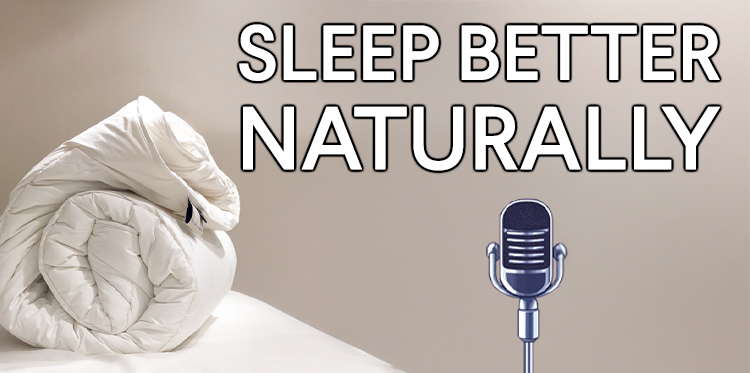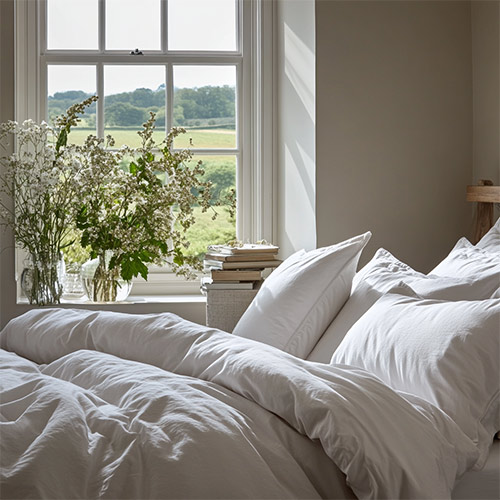The Science of Sleep and How Natural Bedding Can Improve Your Rest

At Devon Duvets, we believe that better sleep starts with the right bedding. Every duvet we individually handcraft in our Devon workshops is designed to help you achieve a more restful night's sleep. Getting quality sleep means not waking up in the night feeling too hot or cold, as disrupted sleep impacts on our overall wellbeing. But what does science say about sleep and how do natural materials like wool and cotton make a difference?
Why is temperature regulation important during sleep?
The ideal room temperature for your body to achieve the best sleep is 16°C – 18°C. This triggers the signals to your body to slightly lower your body temperature, which is needed for you to fall asleep. Your body temperature fluctuates during the night but if you get too cold, or too hot, your body will instinctively react to restore balance, which can pull you out of deeper sleep cycles, even if you don’t fully wake up. According to the Sleep Foundation, fluctuations in body temperature are one of the most common causes of night-time waking.
This is where wool outperforms synthetic materials. Wool has a natural ability to regulate body temperature. It works with your body and the temperature in your bedroom to help balance your core body temperature. So, wool isn’t just for winter when it helps you to stay warm but is also great for the summer, because its temperature regulating properties means that it can release heat to keep you cool in summer. Wool’s natural thermoregulation properties therefore create a more stable microclimate around your body, helping you to sleep longer and more deeply.


How does natural bedding manage moisture?
During our sleep, we all lose moisture through our skin and through breathing. Wool has the natural ability to absorb up to 30% of its weight in moisture without feeling damp. The fibres draw excess humidity away from your skin and release it into the air, keeping you dry and comfortable throughout the night. This ability to release moisture can also help to cool you down in summer. This is another reason why natural duvets, and particularly wool duvets, provide a better sleeping environment.
Synthetic fibres, by contrast, trap moisture against your skin, which can cause overheating or a clammy feeling that may wake you up or disturb your sleep cycle.
What type of bedding is best for allergies?
Natural bedding made from wool is ideal for allergy sufferers. Wool is naturally resistant to dust mites and so is hypoallergenic. At Devon Duvets, we use only 100% British wool, traceable back to farms we know and trust. We don’t use chemicals or treatments that can irritate sensitive skin, making our duvets a natural choice for those looking for a cleaner, healthier sleep environment.


Is natural bedding more sustainable?
Synthetic fibres are derived from petrochemicals and take hundreds of years to decompose. They also shed microplastics that pollute oceans and water systems. In contrast, wool and cotton are renewable and biodegradable.
Sustainability is at the heart of everything we do at Devon Duvets and that’s why we use wool. Our wool is certified traceable 100% British wool and from farmers we know have the highest standards of animal welfare. The wool is cleaned at British mills, and we do not use any chemicals – neither do we bleach our wool to make it whiter. We do not use chemicals to treat our wool because this affects the structure of the wool fibres, smoothing them down. This lessens the ability of the wool fibres to regulate temperature and moisture. We believe wool should be kept as nature intended as this is better for you – and the planet.
We only use 100% cotton for our casings. This is because polycotton blends are not breathable or temperature regulating and are not sustainable. By choosing a duvet made with 100% wool in a 100% cotton casing, you are choosing two natural materials that will work together for better temperature regulation.
The cotton we use for our duvet casings is woven to our strict specifications and using cotton fibres certified by Better Cotton. This global initiative supports more responsibly grown cotton with lower environmental impact and fairer working conditions.
Choosing natural bedding - and especially wool bedding - is a small change that can make a big difference for the planet.
Does a higher thread count cotton mean better quality?
While thread count is often marketed as the only measure of quality, what also matters is the quality of the cotton itself.
At Devon Duvets, we use the finest cotton, which is made from Better Cotton certified fibres, and woven to a 260 thread count that balances softness and luxury with breathability. Our tighter weave is also designed to act as a natural barrier, helping to prevent particles such as skin flakes from passing through into the duvet filling. This helps keep the wool inside cleaner for longer.
Quick Q&A: Commonly asked questions about natural bedding
What is the best material for regulating body temperature while sleeping?
Wool is one of the best natural materials for temperature regulation. It adapts to your body’s needs, helping you stay warm in winter and cool in summer, creating a stable environment for deeper sleep.
Can natural wool bedding help with night sweats?
Wool wicks moisture away from the body without feeling damp. This helps reduce discomfort caused by night sweats and keeps you dry and comfortable throughout the night.
Is natural wool bedding better for people with allergies?
Natural wool bedding is ideal for allergy sufferers. It is resistant to dust mites and does not require chemical treatments, which can aggravate sensitive skin or allergies.
What makes cotton certified by Better Cotton more sustainable?
Cotton that has been certified by Better Cotton is grown using sustainable methods that reduce environmental impact and supports better socio-economic cotton farming practices. It is soft, strong, and ethically sourced, making it a more responsible choice.
Why choose wool over synthetic bedding?
Wool is breathable, moisture-wicking, temperature-regulating, hypoallergenic, and sustainable. Synthetic bedding may trap moisture and heat, disrupt sleep, and is less eco-friendly due to its plastic content.
How can I keep my wool duvet clean?
Our high-quality cotton casing is tightly woven to help keep skin flakes and dust from entering the duvet. This helps keep the wool clean for longer. Also, because wool is naturally resistant to dust mites and micro bacteria it is more hygienic and does not require regular washing. We recommend regular airing, which helps to keep the wool duvet fresh, and using a breathable cotton storage bag when not in use.


Experience the difference
Choosing natural bedding isn’t just a lifestyle choice—it’s a decision that benefits your sleep, your health, and the planet. If you’d like to experience the difference for yourself, explore our award-winning, luxurious individually handcrafted range. If you have any questions about any of our proucts, then please get in touch with the team.


